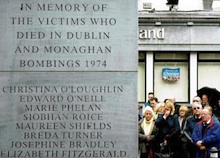
Sinn Fein TD Caoimhghin O Caolain has again raised the need for an independent international inquiry into the Dublin and Monaghan bombings of 17 May 1974.
Last Thursday was the 38th anniversary of the bombings. A debate was held in the Dublin parliament to mark the anniversary.
“Thirty-three people were killed in those bombings which were carried out by agents acting in collusion with British crown forces,” Mr O Caolain said.
“Of that there is now no doubt, but what we do not have is accountability and truth and justice from the British Government.”
Mr O Caolain pointed to the recent revelation that thousands of British government documents detailing some of the most shameful acts and crimes committed during the final years of the British Empire were systematically destroyed to prevent them falling into the hands of post-independence governments, or else flown to Britain where they were hidden for 50 years in a secret archive.
“The government here should certainly ask the British government if files relating to the conflict in Ireland, the Dublin and Monaghan bombings and other acts of collusion in particular, were similarly treated.
“Were some destroyed and some retained secretly and perhaps illegally? We need answers.”
Fine Gael Minister for Justice Alan Shatter said it the “unanimous view” of both houses of the parliament that there was a “continuing need” for such an inquiry. However, he declined to say if his government intended to pursue the matter.
Mr O Caolain also raised a statement in February to the Good Friday Agreement Implementation Committee by the British Direct Ruler Owen Paterson that it had made available a “synopsis” that is relevant to the controversy.
“This apparently refers to a 10-page letter to Judge Barron from former Secretary of State John Reid, dated 26th February 2002,” he said. “Judge Barron expressed his frustration with the lack of information contained in this letter. He repeatedly requested the British government for access to the documents themselves but on every occasion he was refused.
“With a straight face Owen Paterson told the Committee that the British Government ‘has been completely straight and up-front - at every opportunity we have made information available’. The Irish Government cannot let that go unchallenged.”
Mr O Caolain also raised the issue of funding for Justice for the Forgotten.
“The last government ended funding for the group which has done huge work both to support the survivors and the bereaved and to advance the search for truth and justice,” he said.
“In December 2010 the group, while retaining its separate name and identity, merged with the Pat Finucane Centre and secured a limited stream of funding. However, that did not cover the Dublin office which has now regrettably closed. I urge the government to restore funding for Justice for the Forgotten.”
Earlier, wreaths were laid by relatives at the memorial to victims of the bombings on Dublin’s Talbot Street.
Speakers were introduced by Pat Fay, whose father, Patrick, was killed in the Parnell Street bomb that day. Bernie McNally, who survived the Talbot Street bomb, read the names of victims.
The protest heard that a “there is a full story yet to unfold and “that justice has not yet been done.”
Also present was ‘Justice for the Forgotten’ spokeswoman Margaret Urwin, Lord Mayor of Dublin Cllr Andrew Montague, Cavan-Monaghan Fianna Fail TD Brendan Smith, Sinn Fein TDs Sean Crowe and Aenghus O Snodaigh, Socialist TD Clare Daly and Independent TD Mick Wallace.
![[Irish Republican News]](https://republican-news.org/graphics/title_gifs/rn.gif)
![[Irish Republican News]](https://republican-news.org/graphics/title_gifs/harp.gif)

